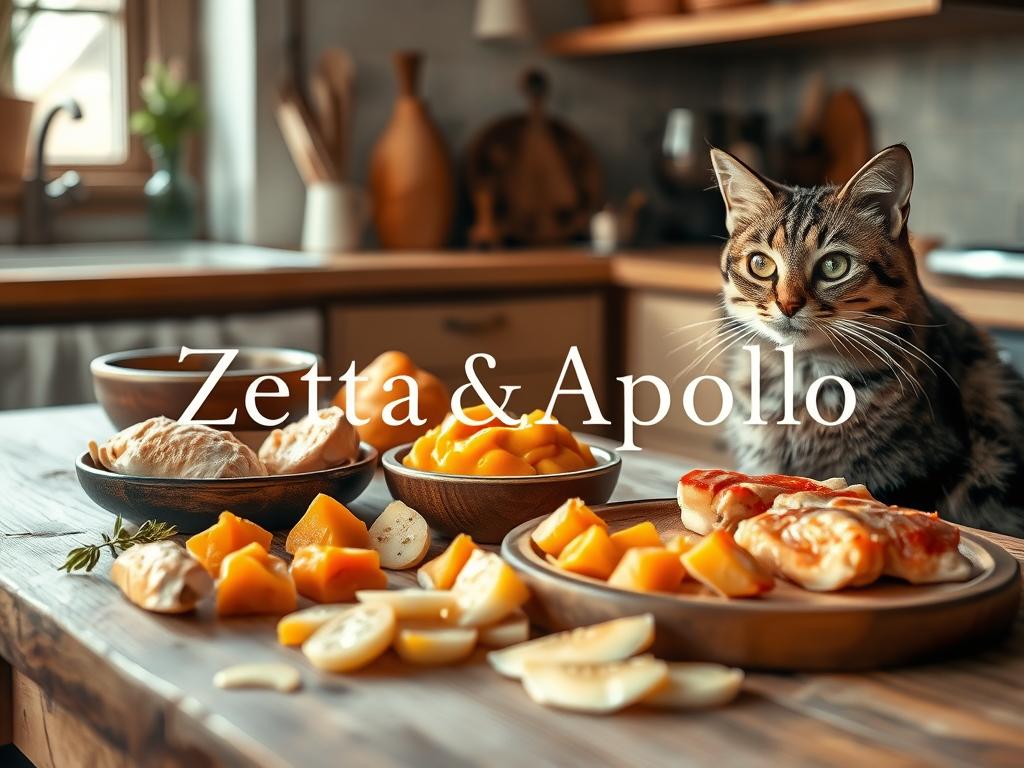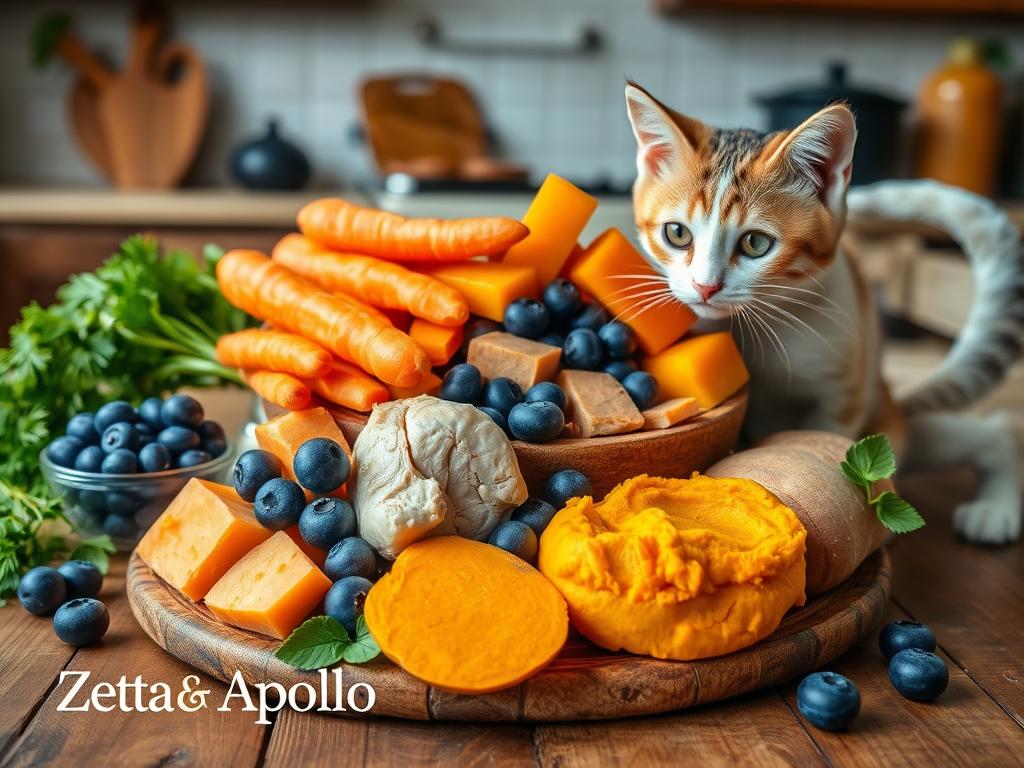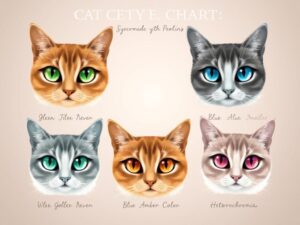“Affiliate Disclosure: Please note that some of the links on this website are affiliate links. This means that if you choose to make a purchase through these links, we may receive a small commission at no additional cost to you. This helps support the maintenance and continuation of our site. We assure you that we only recommend products or services we use personally or believe will add value to our readers. Thank you for your support.”
The sun shines warmly through your window as you make a meal. A gentle purr comes from below, and your cat watches eagerly, hoping for a bit of your food. Sharing human food with your cat can bring you closer and make happy moments. But remember, not all foods are good for them.
In this article, we’ll show the top 5 human foods safe for your cat. We’ll focus on foods that are safe and nutritious for them. This way, you can give them treats that are healthy and keep them happy and safe.
Understanding Cat Nutrition
It’s vital to know what your cat needs to eat to stay healthy. They need lots of animal protein because they are obligate carnivores. Learning about their diet makes them healthier and more active.
Cats need the right balance of protein, fats, vitamins, and minerals. You can find these in quality cat food. But it’s also okay to give them some human foods. Like cooked chicken or turkey, but only in little bits.
Small pieces of cooked chicken or turkey are great treats. You can also give them fish in small amounts. Sometimes, a little bit of cooked beef is okay too, as long as it’s in small cubes.
Vegetables should only be a small part of their diet. Only give them a tiny bit of broccoli, peas, sweet potatoes, or pureed pumpkin. These can be good for them but remember not too much. Too much can upset their stomachs.
Knowing what your cat can eat helps you feed them right. It’s important to choose foods that meet their specific needs. This way, you make sure they get what’s best for them.
Are Cats Obligate Carnivores?
Cats depend on animal-based nutrients for health. They’re known as obligate carnivores. This knowledge is vital when choosing human foods that are safe for cats. Their bodies are made to mostly digest meat. A good diet for a cat has about 50-70% protein, 20-40% fat, and very few carbs, around 1-10%.
Cat food is sold in dry, semi-moist, and canned types. Dry food has 6-10% water, and semi-moist has about 35% moisture. Canned food is the most liked by cats because it has at least 75% water. The AAFCO sets nutrition rules for these foods.
Keep treats under 10-15% of a cat’s daily calories. With cat obesity on the rise, it’s key to know their food needs. Obesity can cause serious health problems like arthritis and diabetes. So, it’s critical to keep their diet in check.
When picking feline-friendly human foods, choose those that fit their carnivore needs. Meaty foods like cooked chicken and turkey are good choices. Make sure they’re cooked right. Be careful with plant-based foods since they might not meet a cat’s nutritional needs.
Knowing cats are obligate carnivores is crucial for their health. Focus on high-quality proteins to give them a balanced diet. This respects their natural eating patterns.
Why It’s Important to Share Human Food Safely
Sharing food with your cat helps bond with them. But, it’s important to only give them safe foods. Cats need meat because they are obligate carnivores. We must pick human foods that meet their diet needs without harmful ingredients.
Cooking methods matter a lot. Make food without spices, oils, or additives that could hurt your cat. Vegetables like carrots and broccoli can be good, but they must be cooked right and chopped up for cats to easily digest them. Knowing the right way to prepare and share means a better life for your cat.
It’s also key to know which foods have nutritional value. Fruits like watermelon and strawberries are great for hydration. They should be given in small amounts because of their sugar. Always check if human foods are making your cat’s diet too calorie-heavy. They need a balanced diet to stay healthy.
Sharing mindfully not only adds good human foods to your cat’s diet but also makes your bond stronger. By focusing on safe sharing, you can enjoy being close with your cat without risking their health.
| Food Item | Benefits | Preparation Tips |
|---|---|---|
| Watermelon | Hydrating | Remove seeds and rind, serve in small portions |
| Carrots | Vitamin A, fiber | Cook thoroughly and cut into small pieces |
| Broccoli | Rich in fiber, antioxidants | Serve plain, cooked in small portions |
| Pumpkin | High in fiber, aids digestion | Serve pure pumpkin without additives |
| Blueberries | Non-toxic, hydrating | Serve in moderation, avoid excess sugars |
Top 5 Human Foods You Can Share with Your Cat
Sharing human food with your cat is enjoyable if you’re careful in your choices. There are many healthy human foods that are great for cats. Here are five human foods that are safe and healthy for your cat.
Cooked Chicken and Turkey
Chicken and turkey are top foods to share with cats. These meats are high in protein but low in fat. Make sure the pieces are small and not seasoned to avoid any health risks.
Importance of Proper Preparation
Preparing human food for your cat the right way is key. Cooking without spices and ensuring meat is thoroughly cooked keeps it healthy. Always remove any skin or bones for safety. Such care will keep your cat safe and strengthen your bond through shared meals.
| Food | Benefits | Preparation Tips |
|---|---|---|
| Chicken | High in protein, low in calories | Cook without seasoning, remove skin |
| Turkey | Similar benefits to chicken, rich in nutrients | Serve boiled or baked, avoid bones |
| Fish | Provides Omega-3 fatty acids | Cook thoroughly, avoid seasoning |
| Lean Beef | High-quality protein source | Cook without sauces, cut into small pieces |
| Plain Yogurt | Good for hydration and calcium | Serve in moderation, ensure low lactose |
Benefits of Fish for Cats
Fish is often given to cats by their owners. The fish benefits for cats include healthy skin and shiny coats. This is because of the omega-3 fatty acids in fish. They also help with joint health and can benefit cats with arthritis. Knowing safe fish types and preparation methods can improve your cat’s diet.
Omega-3 Fatty Acids and Health Benefits
Oily fish like mackerel and tuna are great for cats. They have lots of omega-3 fatty acids which are good for health. A small cooked piece of fish can be a great treat once daily. Adding fish to their diet provides key nutrients and adds something tasty for them to enjoy.
Safe Types of Fish to Offer
It’s important to pick the right fish for cat snacks. Make sure it’s fully cooked and has no bones to avoid choking. Safe fish options include:
| Type of Fish | Benefits | Serving Size |
|---|---|---|
| Salmon | Rich in omega-3 fatty acids, excellent for skin and coat health. | 1-inch cube |
| Tuna | High in protein and omega-3s, ideal for occasional treats. | 1-inch cube |
| Mackerel | Source of omega-3s, beneficial for joint health and inflammation. | 1-inch cube |
| Whitefish | Low in fat and high in protein; a good option for regular meals. | 1-inch cube |
Adding fish to your cat’s diet has many health benefits. Choose the right fish and prepare it safely to create a healthy treat. Keep portions small and avoid giving too much. Your cat will love this seafood treat!
Lean Beef: A Feline Favorite
Feeding your cat cooked, unseasoned beef gives them a big protein boost they’ll love. It’s key to prep it right, without any seasonings or sauces, for a cat-safe meal. These steps help you treat your pet right.
How to Prepare Beef for Your Cat
Choose quality lean beef first. Trim off fat and bones to prevent choking and digestive problems. Beef must be cooked without spices or oils, boiled, baked, or lightly fried. Make sure it’s cooked to at least 160°F (71°C) for safety. Once cooked, cool it down and chop it into tiny bits for easy eating.
Health Benefits of Beef for Cats
Lean beef is great for cats. It’s full of nutrients that keep them healthy and happy, like:
- High-quality protein for muscles
- Iron for energy and healthy blood
- B12 vitamins for metabolism
When given in small amounts, unseasoned beef can be a healthy human food for cats. Always chat with your vet about how often and how much to feed, to keep your cat’s diet balanced.
| Nutrition Aspect | Benefit for Cats |
|---|---|
| Protein | Supports muscle growth and energy |
| Iron | Promotes healthy blood levels |
| Vitamins (B12) | Essential for metabolic health |
Vegetables as Occasional Snacks
Cats mainly eat meat, but vegetables for cats can be good snacks sometimes. Some veggies are safe and healthy in small amounts. Knowing which ones and how to prepare them adds variety to your cat’s meals.
Here are some healthy options to consider:
- Cooked Broccoli: This veggie is packed with vitamins and fiber. It’s good for your cat when cooked and cooled.
- Pureed Carrots: Carrots are full of beta-carotene and provide nutrients in an easy-to-digest form.
- Cooked Spinach: Spinach offers valuable vitamins but should be given with care if your cat has kidney problems.
Remember that moderation is key when feeding your cat. Even healthy snacks for cats can upset their stomachs if given too much. Too many treats can cause digestive issues.
Always watch your cat for any signs of discomfort when trying new foods. Their stomachs can be sensitive. By choosing wisely, you can safely add vegetables to their diet.
Safe Fruits for Cats
Fruits are a great snack for cats if you give them in small amounts. Cats need meat, but some fruits are good for them too. They provide water and vitamins. Make sure to pick the right fruits and prepare them safely.
High-Fiber Options
Choose fruits safe for cats to eat that are high in fiber. Apples, watermelon, and strawberries are perfect. They keep your cat hydrated and offer important nutrients. Here’s a list of safe fruits and how much to give:
| Fruit | Benefits | Serving Size |
|---|---|---|
| Apples | Hydrating, provides calcium, vitamin C, and pectin | 1-2 small pieces (seeds and stem removed) |
| Bananas | Rich in vitamins B6 and C; contains potassium | 1-2 slices (cut into 3 cm pieces) |
| Mangos | High in vitamins A, B6, and C | 1-2 small slices |
| Strawberries | Contains antioxidants and vitamins | 1-2 pieces (washed, stems removed) |
| Watermelon | High water content, helps with hydration | A few small pieces (seedless and rind removed) |
| Cantaloupe | Low in calories and hydrating | Small cubes without the rind |
Monitor for Digestive Issues
When you give your cat new cat-friendly people foods, watch them closely. Small portions are best to avoid stomach upset. Cats don’t love sweet things much, but some fruits are okay for them. Seeing how they react helps make sure they enjoy these treats.
Other Human Foods to Consider
When looking for foods to share with your cat, you’ll find many options beyond basic cat food. It’s important to add human foods to your cat’s diet carefully. This can make their meals more interesting.
Cooked eggs are a good protein source for cats. But make sure they’re fully cooked to avoid salmonella and E. coli risks. Oily fish, like tuna, are good for your cat’s eyes, joints, and brain. However, they should only make up 10% of their diet.

- Cooked poultry: A safe option. Avoid meats with a lot of salt, like cold cuts, because they can be toxic.
- Cheese: Rich in calcium and protein. Offer it only now and then since some cats can’t handle lactose.
- Vegetables like cooked carrots: They give vitamin A and fiber. Don’t give your cat raw carrots; they could choke.
- Fruits: Blueberries and strawberries are full of antioxidants. Just watch the sugar amount.
- Pureed unsweetened pumpkin: It’s great for digestion because of its fiber.
Moderation is crucial when giving your cat new foods. This careful approach lets you safely add variety to their diet. It ensures their diet remains well-balanced and suited to their needs. Always put your cat’s health first. Avoid foods with too much sugar or anything that could cause stomach problems.
Foods to Avoid Sharing with Your Cat
Ensuring your feline friend’s safety requires knowledge of harmful foods. Some human foods can seriously affect cats’ health. Knowing which items to avoid is key to their well-being.
Common Toxic Foods for Cats
There are specific human foods that can harm cats. Being mindful of these can protect them from illnesses:
- Chocolate: It contains theobromine, dangerous to cats, causing heart issues and seizures.
- Onions and Garlic: Even tiny amounts harm red blood cells. Garlic is particularly toxic.
- Grapes and Raisins: They can damage the kidneys. The cause is still not clear.
- Alcohol: Very dangerous. It can put cats in a coma or kill them.
- Xylitol: This sugar substitute can lead to liver failure in cats.
- Raw Meat and Eggs: Pose a risk of Salmonella and E. coli.
- Caffeine: Causes restlessness, vomiting, and a high heart rate. Large amounts can be deadly.
Signs of Food Poisoning in Cats
Knowing the signs of food poisoning is essential. The main symptoms to watch for include:
- Vomiting
- Diarrhea
- Lethargy
- Seizures
If your cat shows any symptoms after eating something toxic, call your vet right away. Fast treatment is key to handling food poisoning, even though it’s rare in cats.
Pro Tips for Sharing Human Food with Your Cat
Sharing human foods with cats can add to their diet. But, you must do it thoughtfully, following certain rules. Give them only small bits of food to avoid stomach issues. It’s key to watch for any bad reactions after they try new foods.
These treats should just be an extra, not the main part of their diet. Regular cat food should be their main source of nutrients. To keep mealtime fun, hide treats or use food puzzles. These activities are good for their minds and help you bond with your pet.
- Portion Control: Keep treat sizes small.
- Monitor Reactions: Watch for any signs of allergy after feeding new foods.
- Engage with Puzzles: Use food puzzles for a fun experience.
- Hydration Matters: Offer hydrating options like watermelon, but be cautious of sugar content.
- Consult Your Vet: Always check with a veterinarian before adding new foods to your cat’s diet.
Feeding your cats scraps from your plate can bring you closer, but being wise about it is crucial. Know what foods are safe and full of nutrients. This ensures a healthy, joyful life for your fur baby.
Conclusion
We have looked at which human foods are safe for cats. Cats need mainly meat in their diet. They do well with cooked chicken, fish, and lean beef. Small bits of veggies and fruits are also good. But always prepare these carefully and offer them in moderation.
Safe portions include a 1-inch cube of cooked meat or the same size of fish. Small amounts of veggies like broccoli or pumpkin are beneficial. Sometimes, give blueberries as a treat. These should be occasional treats, not the main part of their diet. A complete cat food diet is crucial for their health.
Sharing your food with your cat in the right way is good for both of you. It makes their diet more interesting and strengthens your bond. Just make sure treats are suitable for them. This way, mealtime becomes a moment of joy and health.





